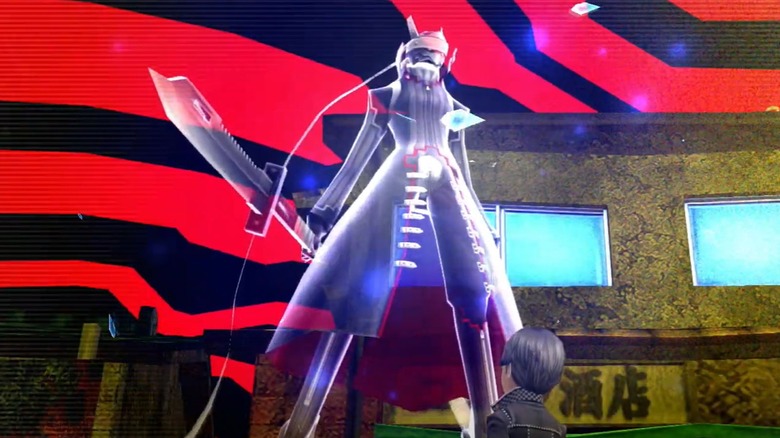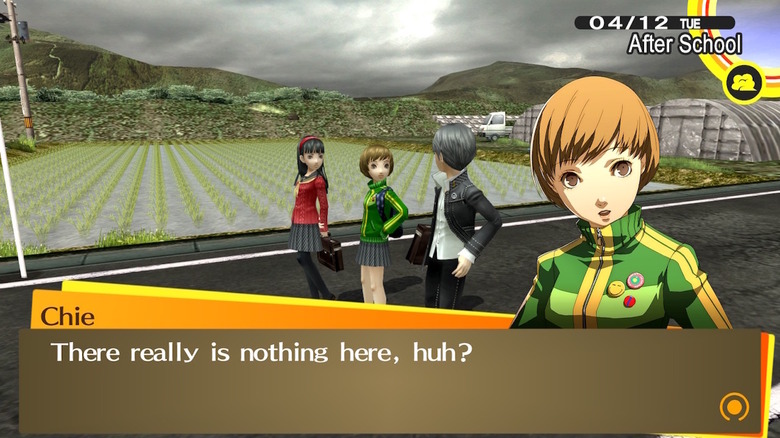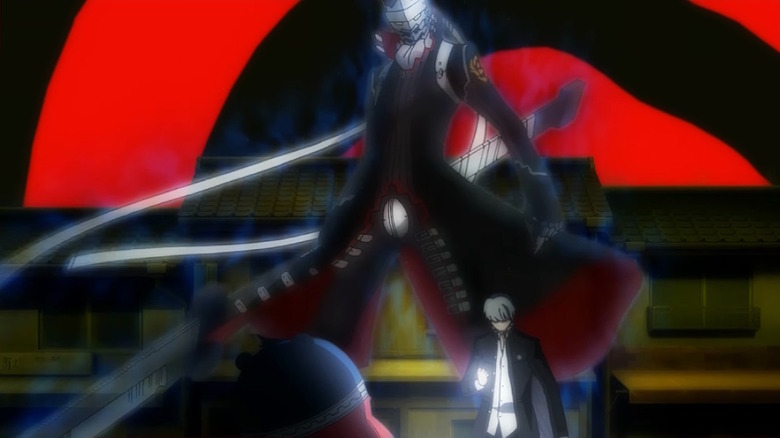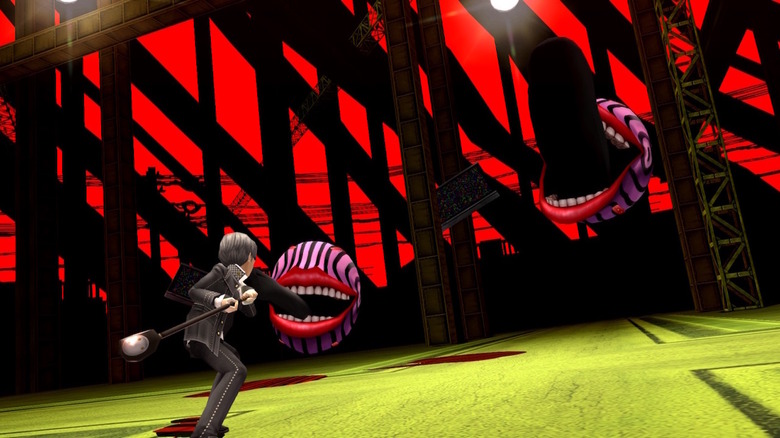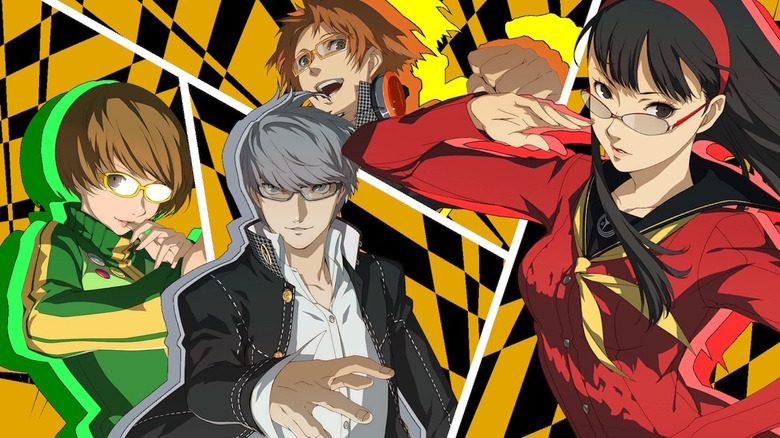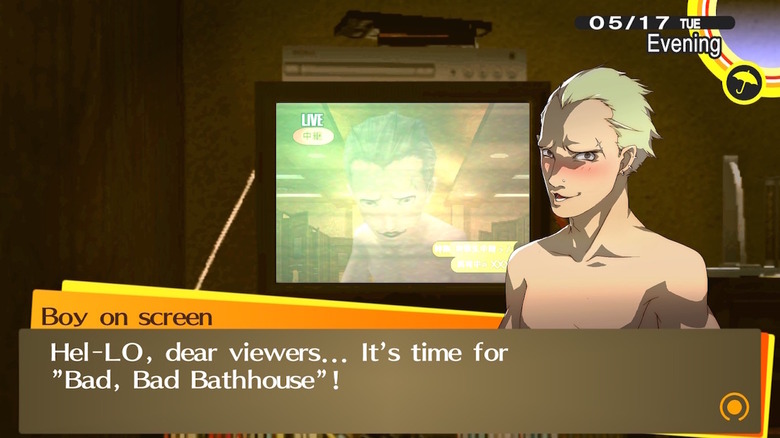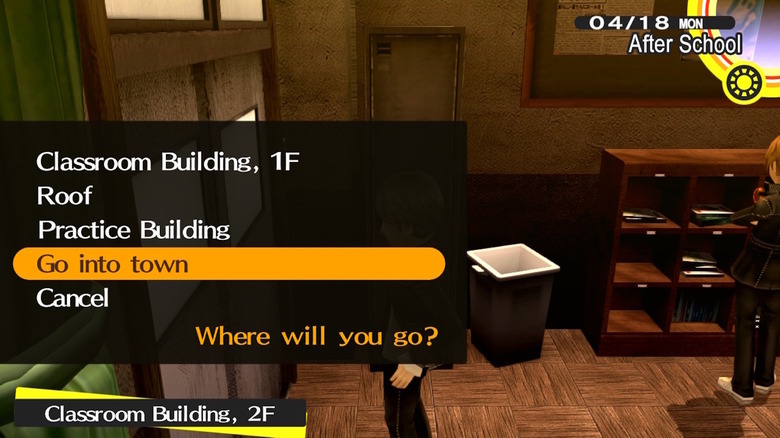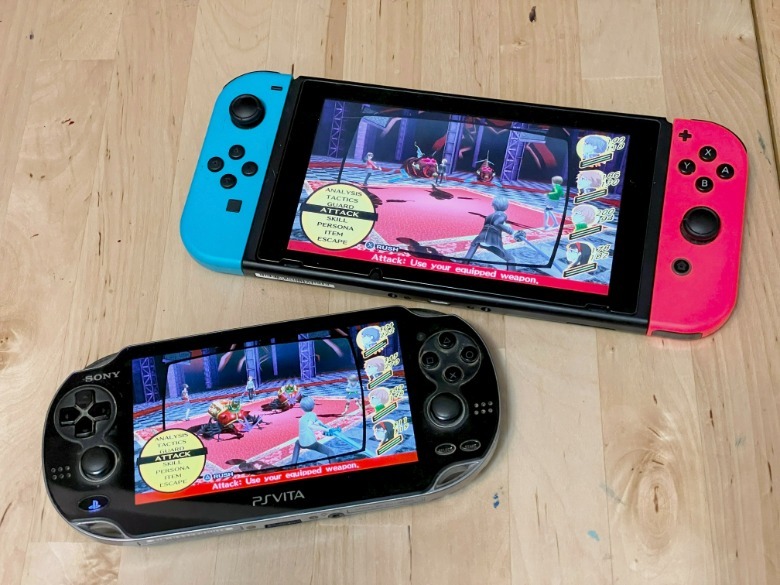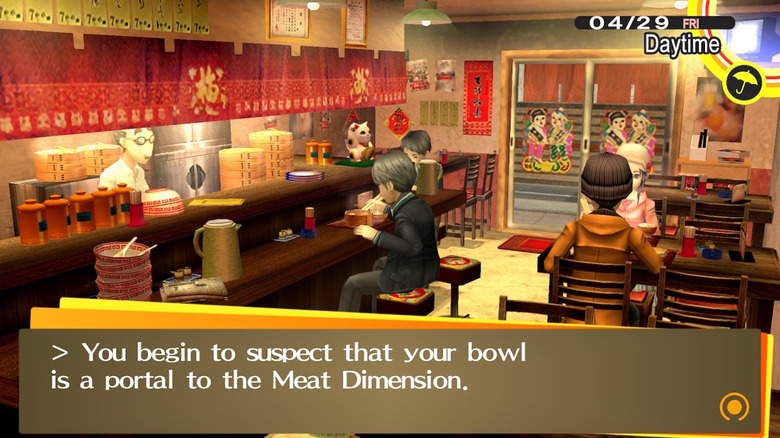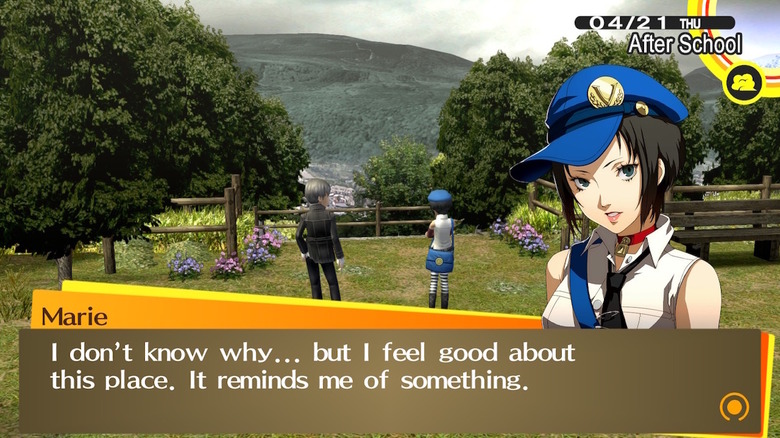Persona 4 Golden Switch Review: As Good As Ever
- An intriguing mystery to solve
- Loads of memorable characters
- Satisfying and rewarding RPG combat
- One of the best soundtracks in the business
- No significant difference vs other “Golden” releases
- All of the infamous script problems remain
While the capability of looking at "Persona 4 Golden" with a more objective lens is certainly here, this review is going to be extremely subjective anyway. Even though this is "just" a port of a PlayStation Vita upgrade that came out in 2012 — and was derived from the 2008 PlayStation 2 original — the lack of anything meaningfully new doesn't matter in the slightest. So if you're only interested in if this Switch release can offer you more than what you've already played on the Vita or PC, you're going to be disappointed.
Because for as sentimental as "Return to Monkey Island" was, "Persona 4" is way worse (or better, depending on how you look at it). "Monkey Island" was a surprise with how much it tugged at heartstrings and reminded players of an affection long since forgotten. But "Persona 4" is on a whole other level. To have an excuse to play through it again on a new platform is more than enough to satisfy.
Unless you really love this game, haven't played the "Golden" iteration, or haven't played it at all, there's not much (in the Switch port) worth your time. But if you meet just one of those criteria, here's why you should be thrilled to return to Inaba.
Welcome to Inaba
The small, rural town of Inaba is where you (as the protagonist) will be spending the next year. You'll have to stay with your police detective uncle, Dojima, as you get used to a new high school and try to carve out something of a new life for yourself. Too bad it's not actually that simple.
Shortly after hearing about a local legend involving something called "The Midnight Channel," which will supposedly reveal your soulmate when you look into a blank TV screen on a rainy night, things get weird. You give this Midnight Channel thing a try and you do actually see someone on TV, though you can't quite tell who. Then a dead body is found hanging from a TV antenna on a foggy day, with no apparent cause of death or motive and bearing an uncanny resemblance to the person you saw on The Midnight Channel. A few days later, another person appears on-screen on a rainy midnight, and another body turns up on another foggy day, hanging from a telephone pole.
Are these deaths connected to The Midnight Channel somehow? Are these predictions or threats? Are these people dying or is there a serial murderer running around town? It's up to you and your friends to cut through the figurative (and literal) fog to discover the truth. Thankfully, you have a little supernatural help on your side.
'The strength of heart required to face oneself'
Through some sort of bizarre coincidence, your character has the ability to pass into any television screen he touches into another world filled with dense fog, and it seems like it might somehow be connected to The Midnight Channel. What's more, dangerous creatures called "Shadows" wander the surreal landscape. Did those victims end up in here somehow, without the means to fight back against these monsters?
The same could be said of you and your friends who unwittingly stumble into this strange world, but you have an advantage. You have a Persona.
Personas act as a sort of manifestation of the "masks" or "personalities" that we show other people in our day-to-day lives. But in this world, these "other selves" can be called upon in battle to cast spells, grant aid, and perform other useful functions beyond anything a regular person could accomplish on their own. You have your own from the start, but as the investigations progress and your friends begin to face their true selves, they'll be able to join you in combat and bring their own unique strengths and weaknesses to each fight.
What really sets your own character apart is his ability to switch between multiple different Personas, as well as fuse them together to create entirely new (and much stronger) manifestations. The catch is that your own Personas have limits to the number of skills they can learn as they level up, while your companions' un-swappable Personas will continue to gain new abilities for a very long time.
A weirdly fun grind
"Persona 4 Golden" is an RPG, so expect turn-based battles and a whole lot of fighting for the sake of increasing character levels and gathering useful items. That said, despite the need to grind in order to keep your characters sturdy enough for future situations and to sometimes farm materials in order to fulfill simple NPC quests, the fighting never really wears out its welcome. Sure, it's weird that someone at school needs a wire you can only find by defeating a specific enemy in a specific dungeon (instead of, like, buying it in a store), but the experience is too enjoyable to be bothered by the absurdity. Or by what many would probably consider drudgery.
What works in this game's favor is the energetic and dynamic way it approaches typical RPG combat and the utterly fantastic soundtrack. Shadows and characters having particular elements, strengths, and weaknesses is nothing new, obviously, but the "Persona" series takes things a bit farther than simply meting out more or less damage.
Hitting an enemy with something it's weak against or landing a critical hit will knock it down (though be careful because the same can happen to you), and if all enemies are down you can perform a flashy and devastating group attack. Some spells and abilities will force you to change tactics by increasing hit rates, decreasing defense, locking out Persona use entirely, and so on. Or, if you manage to improve your friendships outside of combat, your allies may be able to perform follow-up attacks, cure certain status ailments automatically, or even unleash their own dual attacks with someone else.
The friends we made along the way
When you're not up to your eyebrows in alternate-world shadow monsters, you still have to live your life as a high school student. That means studying, taking tests, taking on a part-time job or two, joining clubs, hanging out with friends, and making new ones. This brings us to Social Links, their importance to their respective characters' development, and the effect they can have on your Personas.
A whole lot of characters in "Persona 4 Golden" have the potential to open up a new social link, with each link connected to an Arcana (Tower, Fool, Justice, etc.) that corresponds to its own category of Persona. Every time a Social Link gains a level, any Persona of that Arcana you fuse will get an immediate experience boost — and possibly even learn a special new skill). As a bonus (though, for argument's sake, it's the real reason to keep improving Social Links), your relationship with that character will grow stronger and you'll learn more about them.
Getting to know these characters — whether they're part of your friend group that's investigating The Midnight Channel or they're completely oblivious to what you do inside the TV — can be very rewarding in its own way. It was easy for me to connect with, or in some cases sympathize with, pretty much everyone I got to know throughout my various playthroughs — to the point where once the ending credits started to roll, I felt like I was saying goodbye to several real friends.
Where the script goes wrong
It's not really possible to write about "Persona 4" without acknowledging its rather inappropriate, derogatory, and oversimplified approaches to particular themes. The series is kind of infamous for handling these subjects in less-than-thoughtful ways, and this entry isn't a guilt-free experience.
Teachers will occasionally make inappropriate comments about a student, the game constantly makes fun of one side character's weight, and even some of the less targeted "jokes" include terminology that didn't really sit well back in 2008, let alone today. But far and away the biggest problem all versions of this game have is the way it bumbles through LGBTQ+ representation.
One of the dungeons is basically a running queer joke; complete with the kind of stereotypical, lispy, forced "feminized" line delivery that was more common in popular media in the 2010s. And then there are the queer and transgender themes that could have been given more thoughtful (or at least respectful) time in the spotlight — what with it being a major focus for two of the main cast members — but these are brushed aside as a footnote.
It's not really reasonable to expect a complete overhaul of these elements for a Switch port of a 2012 update of a 2008 game. But it is a shame the script was like this in the first place, and it continues to be a disappointing blemish on one of my favorite games of all time.
[Thank you to Veerender Singh Jubbal for providing sensitivity reading services for this segment.]
The Golden touch
What sets "Persona 4 Golden" (whether on PlayStation Vita, PC, or now Switch) apart from the PS2 original is the extra content. This is considered the definitive version because it offers the same overarching plot and memorable characters as before, but now with a whole lot of bonus interactions, events, additional Social Links, new Personas, and even more great music. "Golden" gives you so much more, and it's integrated so well that they actually had to remake the anime in order to get the two media to line up more thoroughly.
It's also a better game in general, with a lot of quality-of-life adjustments compared to the 2008 version. You can fast-travel around Inaba instead of manually running everywhere, you have more control over the skills Personas inherit during fusion, you get those aforementioned dual attacks, and you eventually gain access to a garden where you can grow produce that can be very useful inside the TV, and so on. And outside of the game proper, there are even videos, quizzes, and other bonus content you can unlock and access from the main menu as you progress.
There is no good reason to seek out the original version of "Persona 4" when "Golden" exists. Unless you're a collector and want it for the sake of completion or archival purposes, anyway. That said, there's also not much incentive to grab it for the Switch if you already have it available on a different platform.
More of the same
As great as it is playing through "Persona 4" again, it's ultimately just a Switch port. Get it if you want to play it on Switch, if you haven't played the game before and want to, or if you want to play on something newer than a Vita, but without the Denuvo Anti-Cheat caveat found in the Steam release. Any excuse is good enough, really, but there's nothing significantly new here.
The screen is larger because the Switch screen is larger than what the Vita uses (or much larger if you count playing on a TV in docked mode). The game does load noticeably faster compared to "Golden" on the Vita, but it's not enough of an improvement to make it a necessary replacement. And with the larger screen size comes improved resolution and overall sharper visuals when compared to the Vita, though again, it's not necessarily enough of a bump in quality to make it a necessity.
The only real difference easily spotted between the 2012 Vita release and the 2023 Switch port is the addition of a suspend save option. So, if you play on the Switch you can create a temporary save and then quit the game if you need to turn off the system or load up other software. That's handy if you have to share with other people, but outside of a few very specific scenarios, it'd be odd that someone couldn't just push the Home button to suspend their game and then come back to it later.
Persona 4 Golden (Switch) verdict
I know "Persona 4 Golden" on Switch is nothing new. It's a port of a port that did add a bunch of new and worthwhile things to the core game — but said additions were made back in 2012. There's nothing special about this compared to any of the other versions of "Golden" on the market.
Except it's also incredibly special, precisely because it's "Persona 4 Golden."
There's no doubt that most people taking a look at the eShop listing will pass it over without much thought, either because it's an old game or because they've played it (or another "Persona") before. But if you've never played it before, you should give it a try now. It's just as good on the Switch as it is everywhere else, despite its sometimes uncomfortable writing and mishandling of certain themes, and it's well worth playing if you're interested in the mystery or enjoy turn-based RPGs in general.
At $20, I was more than happy to buy yet another copy of "Persona 4," but truth be told I would've gladly paid triple that simply because owning it on my current favorite platform gives me more reason to revisit a video game that is one of my favorites of all time.
It's an excuse to go back to Inaba. And it's an opportunity to see my friends again.
No, that's not an objective assessment, but this game meant the world to many gamers back in 2008 and it still does well over a decade later. Objectivity doesn't factor into it.
A Nintendo Switch code was purchased by the writer for this review. "Persona 4 Golden" is available now on Xbox One, Xbox Series X|S, PS4, and the Nintendo Switch as part of the Persona 25th Anniversary.
